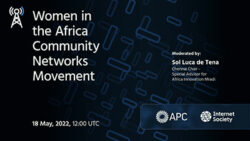As most responses to the COVID-19 pandemic were online, the unconnected were excluded not just from access to the Internet but also to much-needed information and services that affected livelihoods, education, and health.
Community networks (CNs) are a holistic approach to digital inclusion. They are citizen-driven networks that are deployed, operated, and maintained by communities in a way that aligns with their local needs and priorities.
However, community networks are male-dominated and are therefore contributing to a greater gender divide. So, as the community network movement continues to grow in Africa, it’s important that we view them through an intersectional and gender-informed lens.
About the session
This session looked at the role that women play in community networks, the challenges and, more importantly, opportunities for change.
We explored the following questions, and more:
- Who designs, runs, and leads community networks?
- What role are women playing in building the community networks movement in Africa?
- What are the experiences of women involved in community networks?
- How can CNs expand the space that women are trying to occupy in the community networks movement?
- How can we create CNs that are gender-informed and include the rights of women even in the most rural and marginalized parts of Africa?









